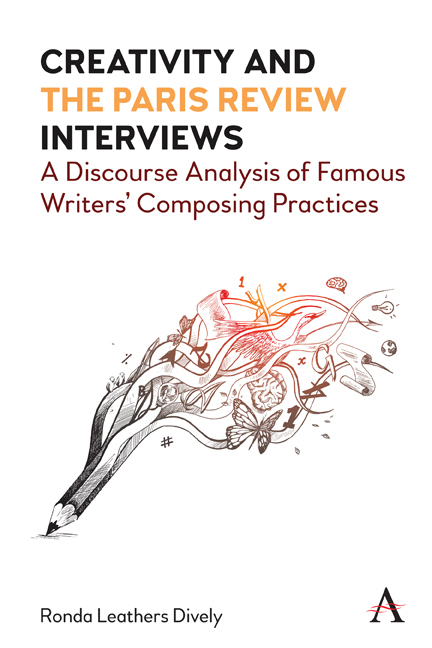 Creativity and 'the Paris Review' Interviews
Creativity and 'the Paris Review' Interviews Book contents
- Frontmatter
- Contents
- List of Illustrations
- Preface
- Acknowledgments
- 1 Impetus, Contexts and Methods
- 2 Composition through the Lens of Creativity Theory
- 3 First Insight, or the Glimmer of Possibility
- 4 Preparation, or Research Broadly Conceived
- 5 Incubation, or Breaks from Conscious Attention
- 6 Insight, or the Eureka Experience
- 7 Verification, or Evaluation
- 8 Emergent Patterns
- 9 Implications for Writing Instruction
- Appendix A Coding Table
- Appendix B List of Cited Paris Review Interviewees
- Appendix C Diagram of Analytical Categories, Subcategories and Themes
- References
- Index
- Frontmatter
- Contents
- List of Illustrations
- Preface
- Acknowledgments
- 1 Impetus, Contexts and Methods
- 2 Composition through the Lens of Creativity Theory
- 3 First Insight, or the Glimmer of Possibility
- 4 Preparation, or Research Broadly Conceived
- 5 Incubation, or Breaks from Conscious Attention
- 6 Insight, or the Eureka Experience
- 7 Verification, or Evaluation
- 8 Emergent Patterns
- 9 Implications for Writing Instruction
- Appendix A Coding Table
- Appendix B List of Cited Paris Review Interviewees
- Appendix C Diagram of Analytical Categories, Subcategories and Themes
- References
- Index
Summary
I started (and finished) my undergraduate career as an English major. In those days, at my university, English major meant literature major, and I was pleased with that focus. In fact, I loved that program so much that I stayed on to earn a master's degree. But at some point during those two years of graduate study, a significant shift occurred in the way I approached literature. Gradually, I could feel my attention turning from questions about the “whats” of the product to focusing increasingly on the “hows” of the processes that generated the poetry and prose I was reading.
I believe this shift had to do, in part, with the fact that I was also preparing to be a teacher. Having pursued teacher certification at the undergraduate level, I had already completed 16 weeks of student teaching at an area high school, and, as a master's student, I was tutoring several hours weekly in my university's writing center. The challenge of mentoring students who struggled with writing, trying to offer them strategies for composing that could make a difference in the quality of their work as well as in their attitude toward it, altered my focus. I became consumed with trying to understand why, on one end of the spectrum, some individuals suffered under the strain of a given writing task while, on the opposite end, others took it in stride and achieved success relatively easily.
Observing this shift in my attention, one of my professors suggested that I pursue doctoral work in rhetoric and composition, a more eclectic, interdisciplinary field that would welcome such inquiry and allow a broad latitude in approaches to addressing the questions that now motivated me. I took his advice, and, to fast-forward a few decades, I have spent the better part of my career observing, reading and writing about composing processes. Though at different stages of inquiry I’ve applied different lenses, the most compelling to me is creativity theory, a subfield of psychology that explores the cognitive and affective phenomena involved in problem-solving.
Within this subfield exists a corpus of scholarship that productively illuminates questions at the heart of my professional agenda and that will captivate readers who are concerned with invention in any discipline—that is, research examining retrospective accounts of famous creators’ visions and realizations of their greatest accomplishments.
- Type
- Chapter
- Information
- Creativity and 'the Paris Review' InterviewsA Discourse Analysis of Famous Writers' Composing Practices, pp. ix - xPublisher: Anthem PressPrint publication year: 2022


